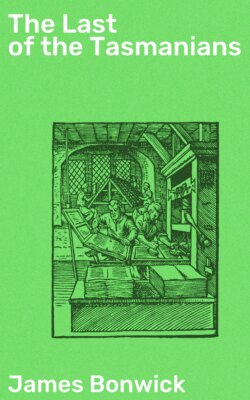Читать книгу The Last of the Tasmanians - James Bonwick - Страница 3
PREFACE.
ОглавлениеMy simple object in the publication of this book was to make known some facts of colonial history not collected by another. It is just possible that my own deep interest in the fate of the Lost Tribes may have led me to overvalue the importance of that knowledge. To me the story of the Tasmanians is so romantic, so affecting, so suggestive, that I, perhaps, have erred in deeming the public sensitive to such sympathies. Anyhow, a sense of duty has actuated the literary venture. Others had laboured for me; I did but return a little.
The critic's forbearance is respectfully solicited. I am conscious of irregularity of style, if not of graver faults. The apology is, that most of the book was written on the voyage from Australia; and those who know the constant disturbing influences of ship-board, and the absolute deprivation of quiet privacy, will be ready to accord me their indulgence.
The difficulties of collecting materials for such a work must be considered. It was not a mere hunt through Blue Books. The forest depths, the sultry plain—the homes of peace, the dens of penal woe—have each brought something to the store. The laugh of the Bushman, the sigh of gentle womanhood, the grief at lost affection, the curse from some remembered wrong, have been the varied accompaniments of tales thus told.
The returning of thanks to those who have aided my efforts is a pleasing duty. Yet where so many individuals have been kind it is not easy to name a few. To the Government officials of New South Wales and Tasmania I am under much obligation. The early records of both colonies were unreservedly submitted to my inspection. To the Australian Library of Sydney, the noble Public Library of Melbourne, and the Parliamentary Libraries of the Colonies, I am also much indebted.
If this simple narrative of the Tasmanians excite some benevolent desire to bless the rude tribes left beneath our sway, my object is accomplished.
The Second Part, soon to follow the present historical work, will speak of the Tasmanians in their home, and everyday life. It may be regarded as a sequel to the book in hand. The one traces their career as a nation; the other will bring them in their individuality before us. We shall see them at their meals, their sports, their sick couch, and their grave. Their songs and laughter will be heard, and their dark traditions told.
Should the British and American public listen favourably to the story of the Tasmanians, other chapters of early colonial days, as singular as they are interesting, may be unfolded.
It is with humble confidence in the sympathy of philanthropists, and a respectful reliance on the generosity of Anglo-Saxons in both hemispheres, that the book is launched upon the waters of the literary world.
James Bonwick.
Acton, London, October 18, 1869.
